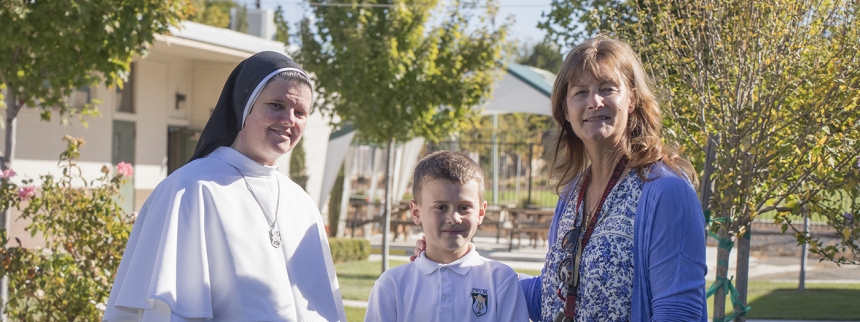
When “Disciple of Christ: Education in Virtue” was rolled out in 2014 at Presentation School in Sacramento, “teachers and families were a little cautious, because it almost seemed as if we were saying ‘you’re not virtuous,’” recalls Carrie Donahue, principal since 2016, who served previously for several years as a teacher and vice principal.
“But we were ready to embrace a change and the program just took off like wildfire,” she says. “There’s a reason for that. It’s the way we are made, and virtues speak intrinsically to who we are. It’s a beautiful fit.”
Presentation School, with 240 students and a staff of 30, including five Dominican Sisters of Mary, Mother of the Eucharist, was the first school in the diocese which has fully implemented the virtues program.
“Students know the lexicon and the targets. The kids live it,” Carrie notes. “When we have to discipline, we have a conversation about what virtue did you miss when you did this or that, when your friend hurt your feelings, and what virtues could he or she have looked closer at to communicate with you or treat you better.”
Behavior on the playground and throughout the school has improved, Carrie says. “The children have very true targets – they see them, they imagine them, and they apply to an individual, an event, a class, to parents and to family conversations at home – simple but true.”
Dominican Sister Maria Karol Hamacher, second grade teacher, says she finds learning the virtues “a positive way to enforce good habits, and students are excited and eager to do what is good. They love it when a teacher or other classmates recognize virtuous behavior in them. One of the joys as a teacher is when a student comes up to me and says ‘I saw a classmate show prayerfulness in church or kindness on the playground.’”
Third grader Teddy Burke says some of the virtues that are most important to him are self-control, prayerfulness and gratitude. “Practicing gratitude in school is saying to my teacher thank you for having extra recess or doing a nice project we didn’t do before. It’s good to teach the virtues to my classmates, so they can be virtuous in playing sports, doing their classwork or getting things done, instead of talking or minding each other’s business. Learning the virtues makes me think before I act or speak.”
Sister Maria Karol emphasizes that “living a virtuous life is a lifelong task. The more they practice, the easier it becomes to be good, open to the graces of God, and happier in their lives.”
In photo above, Dominican Sister Victoria Marie Edge (left), third grade teacher, third grader Teddy Burke, and principal Carrie Donahue, at Presentation of the Blessed Virgin Mary School in Sacramento.

